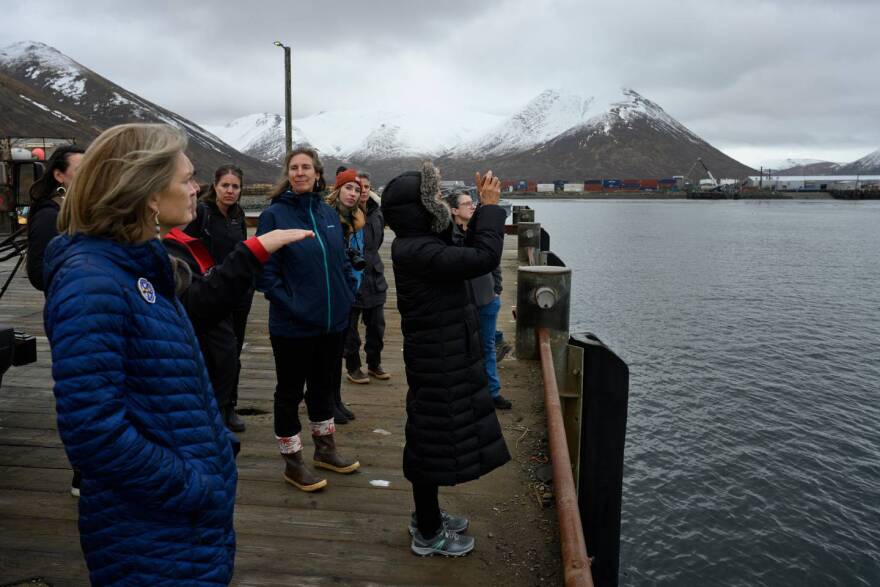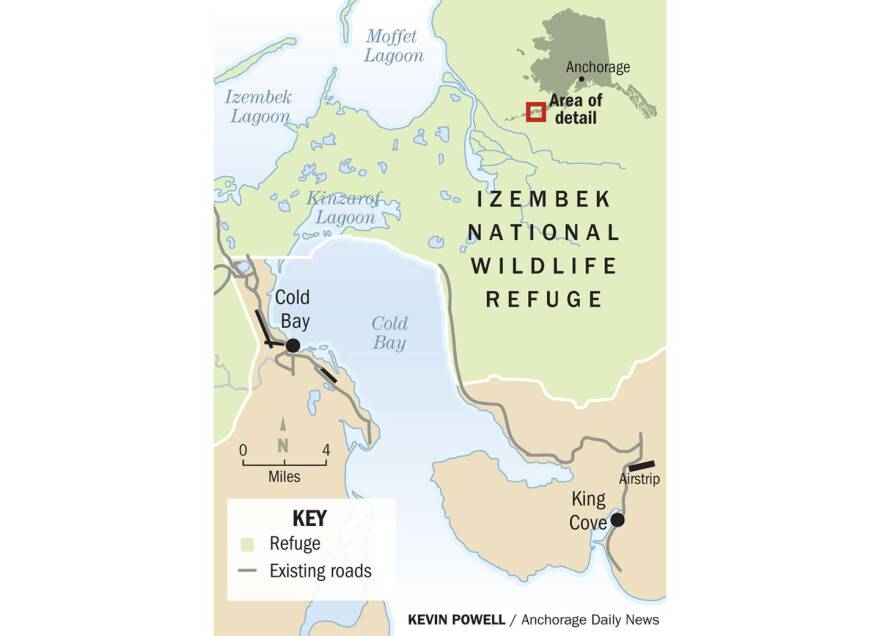KING COVE — As Interior Secretary Deb Haaland’s trip to the Southwest Alaska village of King Cove approached, aides feared bad weather could force her flight’s cancellation — an ironic twist, since locals’ most urgent message for her was their need for more reliable transportation.
But Wednesday dawned with only light winds and high ceilings, more than adequate weather for travel to the end of the Alaska Peninsula. And at 10 a.m., one of the Biden administration’s most powerful officials touched down in King Cove, 4,000 miles from her office in Washington, D.C.


Over the course of the day, Haaland, on her first official trip to Alaska, got a crash course in rural living and the state’s fraught relationship with the federal government, which manages some 60% of Alaska’s land.
King Cove is something of a poster child for that relationship: Residents are predominantly Indigenous, and much of the land that surrounds the village is part of the Izembek National Wildlife Refuge, outside their control and off limits to development.
For decades, King Cove has pushed the federal government for permission to build a road through the center of the refuge that would end in the nearby community of Cold Bay. A huge jet runway there — a relic of a secret World War II military base — would allow better access to lifesaving medical flights than does King Cove’s dirt airstrip.
Traveling in Haaland’s chartered twin-engine Cessna was Republican U.S. Sen. Lisa Murkowski, a longtime road supporter who’d pressed the secretary during her confirmation process to hear from King Cove residents.
GOP Gov. Mike Dunleavy, a persistent Biden administration critic, was relegated to his own plane; it landed as Haaland was already climbing into King Cove’s miniature school bus to start her tour of this fishing town of 900.
After hours of passionate testimony from King Cove residents at the village health clinic, school and senior center, Interior Department officials said they expected to have some hard conversations about the road once their weeklong Alaska trip is over.
But Haaland, who listened attentively and quietly, made no commitments in her brief comments at the end of her last meeting — though her voice shook with emotion.
“I’ve had a wonderful time visiting with all of you and seeing all of you,” Haaland said. “I just want you all to know that I’m really happy to be here in your community, and I’ll look forward to visiting again, hopefully, sometime.”


Innumerable boat rides and helicopter rescues
The roots of King Cove’s conflict with Haaland’s agency date to 1980, when Congress passed the Alaska National Interest Lands Conservation Act.
The legislation designated 95% of the Izembek refuge — named for a Russian surgeon — as wilderness, the highest protection for federal land. Its tundra and saltwater lagoons are home to bears, caribou and globally significant bird populations.
Since 1980, King Cove residents have endured plane crashes, innumerable rough boat rides to Cold Bay and helicopter rescues, which leaders and residents have long cited as they push for access through the refuge.
“I was young and skinny when we first started this process,” Della Trumble, who heads King Cove’s village corporation, quipped as she awaited Haaland’s arrival Wednesday.


King Cove is rural and remote, nestled in a valley 600 miles from Anchorage that empties into the Gulf of Alaska. Bears regularly wander through town and across the mountain slopes that frame it, and many residents’ lives are still tied directly to the ocean through commercial fishing.
But over the years, King Cove has also become a sophisticated player in Juneau and Washington, D.C., with support from Dunleavy, Murkowski and other powerful elected officials. The village employs lobbyists in both places, and its politics swing conservative: Two-thirds of King Cove voters chose Donald Trump over Joe Biden in the 2020 election.

Trump’s administration was good to King Cove. After a federal judge invalidated a land exchange aimed at authorizing the road, Trump’s Interior Department redid the plan and tried it again.
A different judge rejected it a second time, in 2020. But last month, a federal appeals panel reversed that decision and said the land exchange could proceed, and now King Cove is pressing Biden’s Interior Department to finish the deal.
‘She broke the ceiling for us’

That history was the backdrop for Haaland’s arrival at King Cove’s airport, where her plane was greeted by the mayor, tribal and Native corporation leaders, her own security detail and the town’s entire police force of four officers. Accompanying Haaland was Martha Williams, the national head of the agency that manages the Izembek refuge, the U.S. Fish and Wildlife Service.
After a drive over the hill into town, Haaland’s first stop was the local Alaska Commercial Co. store, where Murkowski pointed out typically high rural Alaska prices for cereal and milk. Then it was on to the waterfront, where Haaland, in a faux fur-hooded Eddie Bauer parka and sneakers, snapped iPhone photos before Dunleavy joined.
Dunleavy was not a formal participant on Haaland’s trip, but he came anyway — in his own plane, accompanied by Dr. Anne Zink, the state’s chief medical officer, and several other aides.

The governor has been a strident critic of Biden’s administration and Haaland’s agency in particular, accusing it of “turning its back on Alaska” by reconsidering Trump-era approvals of natural resource extraction projects.
During a one-minute exchange with Haaland on Wednesday, Dunleavy asked about the length of her Alaska trip and if she’d seen Aleutian volcanoes on her flight into town.
“Through my ice-crusted window,” Haaland replied.
“I appreciate you coming,” Dunleavy said. He added: “June’s a good time to come up. It’s a little warmer.”
From the dock, the visitors drove up to the village health clinic, which was upgraded after a $37.5 million congressional earmark in the late 1990s. That was part of a deal aimed at averting the Izembek road; it also included an $11 million hovercraft operation later abandoned by the community as too costly and unreliable.
After a brief clinic tour, Haaland and the other visitors held a closed-door meeting with staff, who talked about the challenges of caring for patients in King Cove’s remote setting. Then they walked across the street to the village school.
Thirty-two-year-old principal Paul Barker introduced a youth group of traditional Native dancers, who performed a piece symbolizing a volcano.


If Haaland’s trip to King Cove was an opportunity for residents to lobby, it was also a chance to honor her.
She’s the second interior secretary to visit the village — Sally Jewell, from Obama’s administration, came in 2013. But Haaland, a member of the Pueblo of Laguna in New Mexico, was the first Indigenous one.
Dustin Newman, a Native leader who spoke at the school, told the gathered crowd of 100 students and staff that Haaland’s appointment was monumental.
“She’s the first Native American woman to hold the Department of Interior, the place that was sent to eradicate us as Native people,” Newman said. “She broke the ceiling for us and showed us as Native people that we have the ability to hold power.”
After that introduction, Newman led a ceremony to give Haaland, Murkowski and Dunleavy Indigenous names. Haaland’s was Tang^ag^im Anadaa, for “mother bear.” Murkowski’s was Sixsadag^ulux, which means “never breaks in two,” and Dunleavy’s was Tayagux^, which means “man.”


‘These folks live here’
Haaland’s last stop was King Cove’s senior center, where some 50 residents and regional leaders gathered to press for the road and tell their own stories about how hard it can be to leave the village for medical care.
King Cove’s mayor, Warren Wilson, described watching the Coast Guard slide his ill mother, on a stretcher, into a Coast Guard helicopter.
A young mother, Marylee Yatchmeneff, pleaded for road access so she could count on easier evacuations for her infant daughter, who she said had to fly to Anchorage a half-dozen times in the past nine months for medical care. And another woman described loading her 4-month-old baby onto a heaving fishing boat.
“The guys were on deck. And they said, ‘Wait for the swell. When this boat comes up, hand me the baby,’” she said. “That’s just what we have to do to get in and out of here.”

Others complained to Haaland that outsiders can access Izembek to hunt and fish, and that much of the opposition to the road comes from conservation groups based on Alaska’s road system or in the Lower 48.
“Those folks live there,” said Skoey Vergen, chief executive of Aleut Corp., the Native corporation for the King Cove region. “These folks live here.”
Those dissenting groups were not present Wednesday in King Cove. But they’re still examining last month’s court ruling approving the Trump-era land exchange, and an appeal is an option, said David Raskin, president of Friends of Alaska Wildlife Refuges.
“This refuge is not owned by the people of King Cove. It is a great, valued possession of the people of the United States,” Raskin said in a phone interview Thursday. “And to have a small community like that reap horrible damage on one of the jewels of the refuge system would be a travesty, and a terrible blow to the American people.”
With money coming to Alaska from President Biden’s infrastructure bill, the best solution to King Cove’s transportation problems is an upgraded ferry dock in Cold Bay, Raskin said.
He also noted that at least one Indigenous group from a poorer area of Western Alaska, the Association of Village Council Presidents, opposes the road, given the potential harm it could cause to birds that members harvest for subsistence.
Interior officials said they were listening carefully to the testimony in King Cove. But they added that any decisions about the road will also be informed by the future of the lawsuit challenging the Trump-era land exchange, and potential appeals.
Haaland did not take questions from reporters during her visit Wednesday.

And as she left the community meeting to head back to her plane, Dunleavy was not optimistic — though he joked that a Biden administration-authorized road could be called the Deb Haaland Highway.
“She’s seriously listening,” he said. “But she’s going to be here for one day. She’s going to be back there for 364 more days.”






